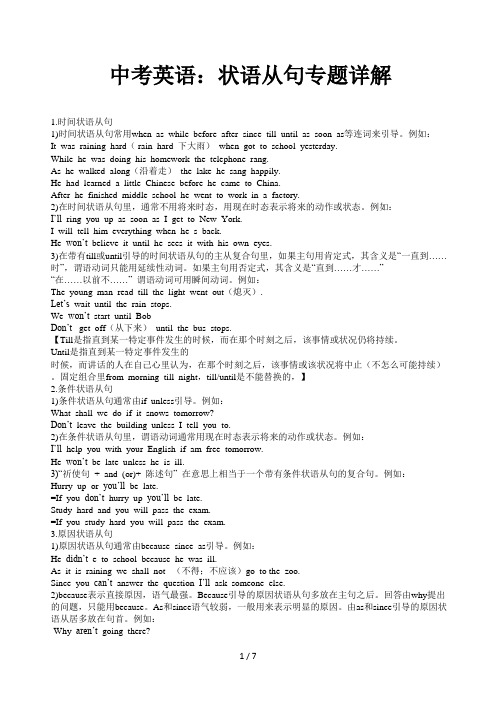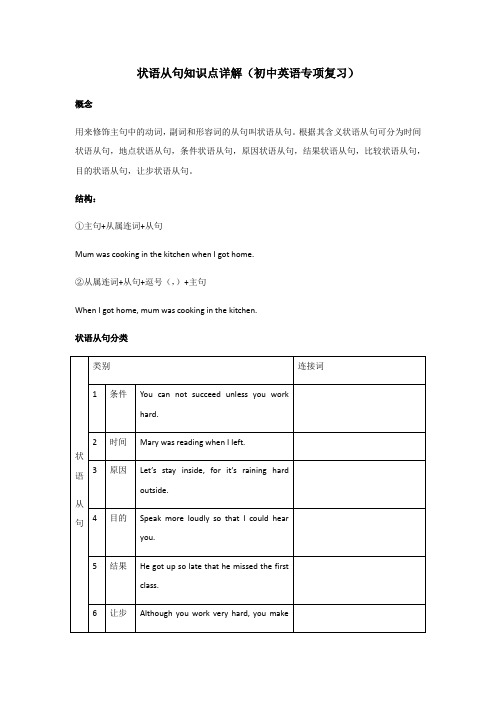(完整版)初中英语语法专题(状语从句)讲解
初中英语语法大全——状语从句(共24张PPT)

eg: Why didn't you give Dick a call?
---
Because I will see him soon.
2. since的用法 since表示人们已经知道的事实,不需要强调的原因, 常意为“既然....”通常放在句首。since引导的从句 是次要的,重点强调主从 句的内容。 eg: Since everyone is here, let's get started. 既 然大家都来了,我们开始吧。 eg: Since you are free tonight. why not drop in and play chess with me? 既然你今晚没事,为什么不来和我下棋呢?
③while表示两个延续性动作同时发生而又有对比意义,主从 句的时态通常是相同的。 eg: While she was making a phone call, I was writing a letter. 她打电话时,我正在写信。 eg: Eddie was sleeping while Millie was reading a ma gazine. 艾迪在睡觉而米莉在看杂志。
初中英语语法大全 状语从句
在句中起状语作用的从句叫作状语从句。状语从句可 以位于句前、向中成向居。位于句首时,常用迅号与 主句隔开,位于句中时以句前后须用过号,位于句居 时,从句的前面可以不用逗号。 状语从句主要包括时间状语从句地点状语从句、条件 状语从句、原因状语从句、目的状语从句、结果状语 从句、让步状语从句方式状语从句和比较状语从句。
5. before, after的用法
before意为“.....之前”时,表示主句动作发生在从句动作之前。 after意为“.....之后”,表示主句动作发生在从句动作之后。 eg: Please turn off the lights before you leave the cla ssroom. 请在离开教室前关上灯。 eg: He arrived after the game started. 比赛开始后他才 到。
英语初中英语语法:状语从句详解

英语初中英语语法:状语从句详解导语状语从句是句子的状语由一个从句充当,来修饰主句中的动词,形容词或副词等。
状语从句都由从属连词引导,与主句连接,放在句末时,一般不在前面加逗号。
状语从句根据它表示的意思可分为时间、原因、条件、目的、结果、让步、比较等。
下面我们拣重点的一个一个来分析。
时间状语从句:是由when, as, while, after, before, since, until, as soon as 等从属连词引导的状语从句。
时间状语从句中的谓语动词不能用一般将来时,只能用一般现在时表示将来发生的动作或存在的状态。
如:I will call you as soon as I arrive there.原因状语从句:because, since, as和for都表示原因。
常常令我们不知该用哪个好。
我们来比较一下。
because语势最强,回答why提出的问题,用来说明人所不知的原因。
当能够很明显的看出原因或人们已知原因,就用as或since。
如:I don't like that coat,because the color looks terrible. 由because引导的从句如果放在句末,且前面有逗号,则可以用for来代替。
但如果不是说明直接原因,而是多种情况加以推断,就只能用for。
如:He is not here, because / for his mother is ill.条件状语从句:由if引导的条件状语从句。
if意为“如果”,引导条件状语从句时,表示假如有从句的动作发生就(不)会有主句的动作发生。
如:If it doesn't rain tomorrow, we will go there by bike.如果明天不下雨,我们就骑自行车去那里。
If I get there early, I can see the doctor quickly.如果我早早地到那里,我就可以快点看病。
中考英语:状语从句专题详解

中考英语:状语从句专题详解1.时间状语从句1)时间状语从句常用when as while before after since till until as soon as等连词来引导。
例如:It was raining hard( rain hard 下大雨)when got to school yesterday.While he was doing his homework the telephone rang.As he walked along(沿着走)the lake he sang happily.He had learned a little Chinese before he came to China.After he finished middle school he went to work in a factory.2)在时间状语从句里,通常不用将来时态,用现在时态表示将来的动作或状态。
例如:I’ll ring you up as soon as I get to New York.I will tell him everything when he s back.He won’t believe it until he sees it with his own eyes.3)在带有till或until引导的时间状语从句的主从复合句里,如果主句用肯定式,其含义是“一直到……时”,谓语动词只能用延续性动词。
如果主句用否定式,其含义是“直到……才……”“在……以前不……”谓语动词可用瞬间动词。
例如:The young man read till the light went out(熄灭).Let’s wait until the rain stops.We won’t start until BobDon’t get off(从下来)until the bus stops.【Till是指直到某一特定事件发生的时候,而在那个时刻之后,该事情或状况仍将持续。
状语从句知识点详解(初中英语专项复习)14

状语从句知识点详解(初中英语专项复习)状语从句的概念: 用一个句子作状语来修饰动词和形容词,以表明动作发生或状态存在的时间、地点、原因等,这个句子就叫做状语从句。
状语从句的分类:状语从句共分为九大类,包括:时间、地点、原因、条件、让步、目的、结果、方式、比较状语从句。
下面分别讲解:一、时间状语从句概念:用来表示时间的状语从句,由when, while, as, till, until,before, after, since等引导。
由于时间状语从句的引导词所表示的意思并非一致,不同引导词表达不同的时间,它们在句子中对应的时态、语态等也有所不同。
例如:when /while引导的时间状语从句when引导的从句的谓语动词通常是瞬间动词,也可以是延续性动词。
从句动作可与主语动作通常先后发生也可同时发生。
I was writing when my sister came back.( come是瞬间动词,只能用when引导,不能用while)He often wrote me when/while he studied in Shanghai International Studies University.( study 是延续性动词,while可代替when)While my mother was cooking , I was playing chess with dad. (cook是延续性的动词,cook和play同时发生)I like playing chess while my sister likes reading stories.我喜欢下棋,而我姐姐喜欢看小说。
(while表示对比)when和while的区别还有:while引导的时间状语从句多用于进行时态,而when引导的时间状语从句多用于一般时态。
While we were playing games, our headmaster called me .我们正在做游戏的时候,校长叫我了。
初中英语语法之状语从句类型及考点讲义

初中英语语法之状语从句类型及考点讲义状语从句概念解析状语从句指句子用作状语时,起副词作用的句子,可以修饰谓语、非谓语动词、定语、状语或整个句子,可分为时间、地点、原因、条件、目的、结果、让步、方式和比较等从句,是英语复合句学习的一个重点,在各类考试中都会经常出现,这次就来给大家讲解一下什么是状语从句。
1. 时间状语从句:常用引导词:when, as, while, as soon as, before, after, since , till, until特殊引导词:the minute, the moment, the second, every time, the day,the instant, immediately , directly, no sooner … than, hardly …when, scarcely … when instantlyI ran into the classroom as soon as the bell rang.2. 地点状语从句:常用引导词:where特殊引导词:wherever, anywhere, everywhereWherever the sea is , you will find seamen.3. 原因状语从句:常用引导词:because=in that, since=now that, as, for特殊引导词:seeing that, now that, in that, considering that, given thatI 'm late because I didn't caught the bus.4. 目的状语从句:常用引导词:so that, in order that特殊引导词: for fear that(唯恐/生怕),in the hope that, for the purpose that, to the end thatYou should book the hotel in advance so that the travel will be more easy.5.结果状语从句:常用引导词:so … that, such … that特殊引导词:such that, to the degree that, to the extent that, to such a degree thatHe is so young that he can't have meal by himself.6. 条件状语从句:常用引导词:if, unless,特殊引导词:as/so long as(只要), only if, providing/provided that(倘若), supposing that(倘若), in case that(以防), on condition thatYou can go to London as long as you have passport.7.让步状语从句:常用引导词:though, although, even if, even though特殊引导词: as(用在让步状语从句中必须要倒装),while,no matter …, in spite of the fact that, whatever, whoever, wherever, whenever, however, whichever, as if=as thoughThough we are old, we still can do these by ourselves.8. 比较状语从句:常用引导词:as(同级比较), than(不同程度的比较)特殊引导词:the more …the more …; just as …,so…,no … more than; not A so much as BShe is as pretty as her mother.9. 方式状语从句:常用引导词:as, as if, how特殊引导词:the wayHe didn't so it the way his brother did.辨析:while,when,as三者引导的时间状语从句时间状语从句算是状语从句中最简单的一类,也是我们日常生活交流中最常用的一类,虽然难度不大,但引导词也不少,仍然有不少同学会弄混那几个常见引导词的用法,这次就为大家带来as,when,while这几个词的辨析方法,一起看看吧。
初中英语语法——状语从句

状语从句一、考点解读今天我们复习状语从句,英语中状语与中文的状语大致相同,分为时间状语、地点状语、原因状语、目的状语、结果状语、条件状语、方式状语等等。
如果一个主从复合句中的从句是用来表示时间,原因等等时,那就称为状语从句。
在主从复合句中修饰主句中的动词、形容词、副词等的从句叫做状语从句,又由于其功能与副词非常相近,又称做副词性从句。
状语从句一般可分为时间状语从句、地点状语从句、原因状语从句、目的状语从句、结果状语从句、条件状语从句、让步状语从句、比较状语从句和方式状语从句九种。
这节课我们主要复习如下的内容:1.时间状语从句2.地点状语从句3.原因状语从句4.目的状语从句5.结果状语从句6.条件状语从句7.让步状语从句8.比较状语从句9.方式状语从句二、专题梳理(一)时间状语从句在句子中起时间状语作用的句子称为时间状语从句。
时间状语从句可以放在句首、句中和句尾。
常用来引导时间状语从句的引导词有:when 当……时候while 当……时候as 当……时候、一边after 在……之后before 在……之前since 自从ever since 自从once 一……就……whenever 不管什么时候by the time 到……as long as 长达……as soon as 一……就……till/until 直到……1.when,while,as的用法从属连词when,while,as都可用来引导时间状语从句,意为“在……时候”。
但在具体用法上又不尽相同。
(1)这三个连词中,when用得最广,常可代替while与as。
与while相比,when引导的从句动词既可是延续性的,也可是终止性的。
as在这一点上与when相同,while所引导的从句中,动词只能是延续性的。
在初中阶段,我们几乎很少讲as引导时间状语从句。
是因为as在初中阶段是一种供了解性的内容。
e.g.When the fire broke out, all the studentswere sleeping soundly.(终止性的)当火灾发生时,所有的学生正在熟睡中。
状语从句知识点详解(初中英语专项复习)7

状语从句知识点详解(初中英语专项复习)概念用来修饰主句中的动词,副词和形容词的从句叫状语从句。
根据其含义状语从句可分为时间状语从句,地点状语从句,条件状语从句,原因状语从句,结果状语从句,比较状语从句,目的状语从句,让步状语从句。
结构:①主句+从属连词+从句Mum was cooking in the kitchen when I got home.②从属连词+从句+逗号(,)+主句When I got home, mum was cooking in the kitchen.状语从句分类时间状语从句条件状语从句常见句型转换题:If...not = unless,在句型转换题中,if (如果)常常和unless(除非)and(那么)或or(否则)互换。
If you don’t get up early, you will fail to catch the bus.(保持句意不变)= You won’t catch the bus unless you get up early.=You should get up early, or you will miss the bus.=Get up early, and you may/ will catch the bus.原因状语从句because 和so 不能用于同一句子中,because表示原因未知,语气最强回答why的提问。
because引导的从句可与because of引导的简单句互换。
as 语气最弱,常常用于口语中,since和nowthat(既然)表示已知的原因,一般放在主句之前。
She didn’t go to see the movie because the weather was bad.=She didn’t go to see the movie because of the bad weather.The sports meeting was put off because the weather was bad.=The sports meeting was put off because of the bad weather.目的状语从句so that +从句=in order that+从句常与in order to 和so as to +短语互换,目的状语从句常常会和情态动词can, may, will, could, might, would等连用He walked quickly so that he could get there on time.=He walked quickly in order that he could get there on time.=He walked quickly in order to get there on time.=He walked quickly so as to get there on time.结果状语从句So...that(如此.......以至于)在句型转换中常常会和enough to do 或者too...to互换,结果状语状语从句常常会和情态动词can, may, will, could, might, would等连用。
2022年中考英语状语从句知识点讲解(原版)

状语从句知识点讲解定义:在句中作状语的从句叫状语从句,修饰主句中的谓语局部。
考点:状语从句有九种,其主要考点为各类连接词,理解句子即可。
一、时间状语从句(1) when/while/as1)when引导的时间状语从句意为“当・・•时候”,表示从句和主句的动作先后或者同时发生。
从句中的谓语动词可以用短暂性动词也可以用延续性动词。
例如:When the teacher came in, we were talking.When I first arrived on this country, I had nothing.2)While引导的时间状语从句意为“当…时候二表示从句和主句的动作同时发生。
从句中的谓语动词必须用延续性动词。
例如:I was sleeping while Tom was watching TV.3)as弓|导的时间状语从句意为“一边…一边”,强调主句和从句的动作同时发生。
例如:She sang as she worked.练一练:1.you came in, I was talking with a few boys.1.1t started to rain we were playing outdoors.3.They talked they walked down the river.4.it was raining, the students were playing basketball.5.Tom watched TV he ate supper.(2)before指主句的动作发生在从句的动作之前。
after指主句的动作发生在从句的动作之后。
例如:I'll be backbefore.你离开之前我就会回来。
What will you do after you graduate?你毕业之后想要干什么?(3)since引导的时间状语从句,从句的谓语动词通常为一般过去时,主句的谓语动词通常为现在完成时例如:He has been worried since the letter arrived.自从收到信,他就一直很担忧。
- 1、下载文档前请自行甄别文档内容的完整性,平台不提供额外的编辑、内容补充、找答案等附加服务。
- 2、"仅部分预览"的文档,不可在线预览部分如存在完整性等问题,可反馈申请退款(可完整预览的文档不适用该条件!)。
- 3、如文档侵犯您的权益,请联系客服反馈,我们会尽快为您处理(人工客服工作时间:9:00-18:30)。
初中英语语法专题(状语从句)讲解
状语从句在复合句中作状语,修饰动词、形容词或副词等。
状语从句可以表示时间、条件、原因、地点、目的、结果、让步、方式、比较等意义。
知识梳理:提纲挈领,抓住重点和难点!
各类状语从句连接词(短语)一览表:
时间 when, while, as, as soon as, since, until, after, before
条件 If, unless
原因 As, because, since
地点 Where
目的 So that, in order that
结果So that, so…that, such…that
让步 though, although, even if, however
方式 As
比较 t han, (not)as…as,
时间状语从句:
Whenever he comes, he brings a friend. 他每次来都带个朋友。
条件状语从句:
As long as I am alive, I will go on studying. 只要我活着,我就要学习。
原因状语从句:
Since we live near the sea, we enjoy nice weather.由于我们住在海边,能享受到好的天气。
地点状语从句:
Put it where we can all see it.把它放在我们都能看到的位置。
目的状语从句:
Finish this so that you can start another.把这个做完,你可以开始另一个。
结果状语从句:
He was so angry that he couldn't say a word. 他气得说不出话了。
让步状语从句:
Though he is in poor health, he works hard.虽然他身体不好,但是他工作很努力。
方式状语从句:
Students do as the teachers say.学生们按照老师说的去做。
比较状语从句:
The work isn't as easy as I thought.这项工作比我想象得难。
例题解析:举一反三,学的更轻松!
1. 易混引导词while, when, as的区别:
when既可以指"时间点",与瞬间动词连用,也可以指"时间段",与延续性动词连用
(=while)。
如:
When he came in, his mother was cooking.
When (While) we were at school, we went to the library every day.
While表示时间段,因此,while 从句的谓语动词要用延续性动词。
如:
Please don't talk so loud while others are working.
As与when用法相似,但着重强调主句动作与从句动作同时发生,有"随着……"或"一边……一边……"之意。
如:
As you get older, you get more knowledge.随着年龄的增长,你获得的知识就越多。
2.Because,as,since 的区别:
Because用于表示直接原因,回答why提出的问题,语气最强;As用于说明原因, 着重点在主句,常译成"由于";since表示显然的或已知的理由或事实,常译成"既然"。
如:
Water is very important because we can't live without it.
He didn't come yesterday as his mother was ill.
I'll do it for you since you are busy.
3.such…that, so…that, so that 引导结果状语从句的区别:
such是形容词,修饰名词; so 是副词,修饰形容词或副词。
其结构如下:
1) such + a (n)+ 形容词+单数可数名词+that……
2) such+形容词+复数可数名词+that ……
3) such +形容词+不可数名词+that……。
如:
This was such a good film that I went to see it several times.
It was such good books that they sell well.
It was such bad weather that I had to stay at home.
He spoke so fast that I couldn't follow him.
He is such a lovely boy that we all like him.
=He is so lovely a boy that we all like him.
注:在"形容词+可数名词复数/不可数名词"结构中,当名词前有many, much, few, little 表示数量的多少时,名词前用so。
如:
She made so many mistakes that she didn't pass the exam.
练习与巩固:熟能生巧,取得好成绩!
选择合适的连接词,完成下列句子。
1.Jim spends a lot of money on books______he is not rich.
2.Kate fell into sleep ______she was listening to the music.
3.----Is David at school today?
----No. He is at home ______he has a bad cold.
4.We won't have supper ______my mother comes back.
5.Speak to him slowly ______he may understand you better.
6. ______ she doesn't come on Sunday, I'll go fishing by myself.
7.It is four years ______I had left that small village.
8. ______the air moves, it is called wind.
9.We will go to the park ______it doesn't rain tomorrow.
10.______little boys did ______much work.
11.There are few new words in the passage ______we can't understand it.
12.Go back ______you come from.
13.He reached the station ______the train had left.
14.----Do you have a swimming pool?
----No, we don't. At least, not ______big ______yours.
15.Give me your paper ______you have finished it.
16.It is raining hard, ______we have to stay at home.
17. ______you work harder, you'll never pass the final exam.
18.Look after the children ______I am out.
19.The village is ______far away ______I can't get there on foot.
20.That is ______an interesting book ______I can't stop reading it. Keys: 1.though 2.while 3.because 4.until 5. so that
6.Even if
7.since
8.when
9.if 10.Such, do
11.but 12.where 13.before 14.as(so), as 15.after
16.so 17.unless 18.while 19.so, that 20.such, that
珠海新思维教育科技有限公司
5
忘记你,我做不到!。
